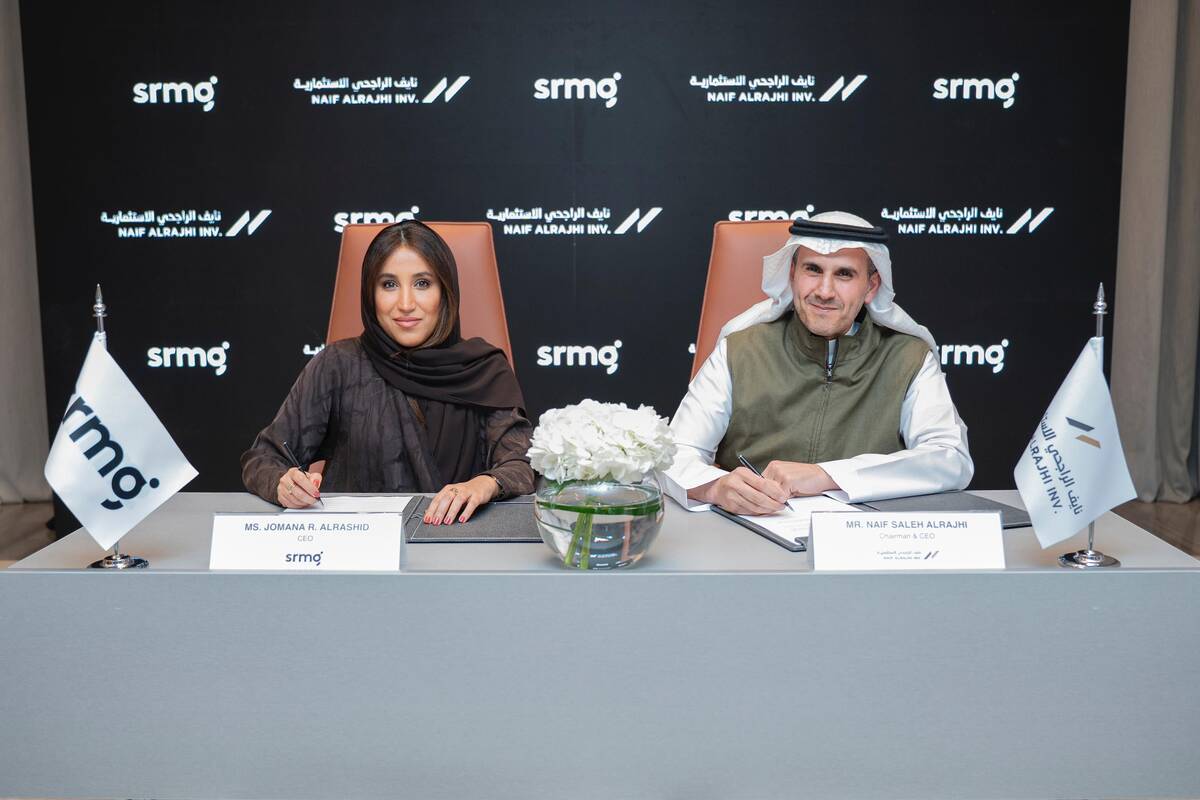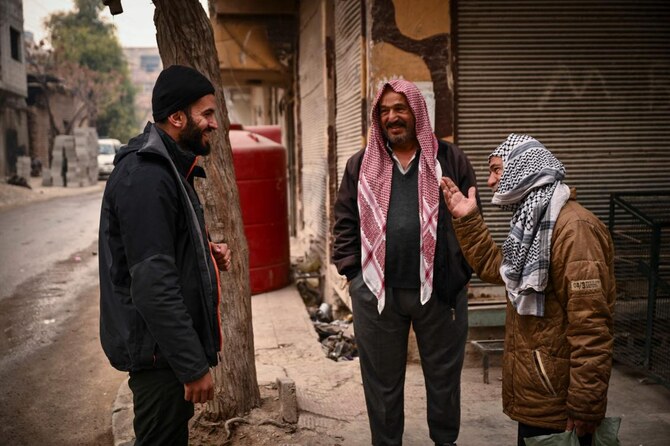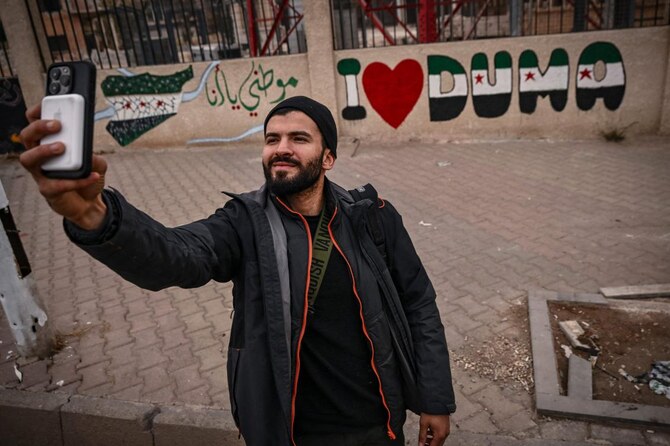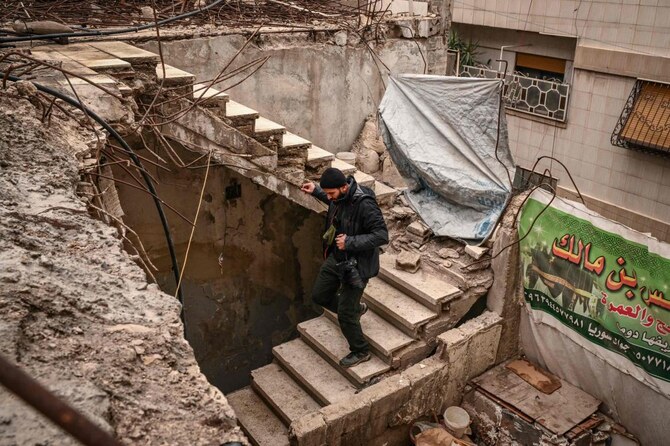DOUMA: AFP photographer Sameer Al-Doumy never dreamed he would be able to return to the hometown in Syria that he escaped through a tunnel seven years ago after it was besieged by Bashar Assad’s forces.
Douma, once a militant stronghold near Damascus, suffered terribly for its defiance of the former regime, and was the victim of a particularly horrific chemical weapons attack in 2018.
“It is like a dream for me today to find myself back here,” he said.
“The revolution was a dream, getting out of a besieged town and of Syria was a dream, as it is now being able to go back.
“We didn’t dare to imagine that Assad could fall because his presence was so anchored in us,” said the 26-year-old.
“My biggest dream was to return to Syria at a moment like this after 13 years of war, just as it was my biggest dream in 2017 to leave for a new life,” said the award-winning photographer who has spent the last few years covering the migrant crisis for AFP’s Lille bureau in northern France.
“I left when I was 19,” said Sameer, all of whose immediate family are in exile, apart from his sister.
“This is my home, all my memories are here, my childhood, my adolescence. I spent my life in Douma in this house my family had to flee and where my cousin now lives.
“The house hasn’t changed, although the top floor was destroyed in the bombardments.
“The sitting room is still the same, my father’s beloved library hasn’t changed. He would settle down there every morning to read the books that he had collected over the years — it was more important to him than his children.
“I went looking for my childhood stuff that my mother kept for me but I could not find it. I don’t know if it exists anymore.
“I haven’t found any comfort here, perhaps because I haven’t found anyone from my family or people I was close to. Some have left the country and others were killed or have disappeared.
“People have been through so much over the last 13 years, from the peaceful protests of the revolution, to the war and the siege and then being forced into exile.
“My memories are here but they are associated with the war which started when I was 13. What I lived through was hard, and what got me through was my family and friends, and they are no longer here.
“The town has changed. I remember the bombed buildings, the rubble. Today life has gone back to a kind of normal as the town waits for people to return.”
Douma was besieged by Assad’s forces from the end of 2012, with Washington blaming his forces for a chemical attack in the region that left more than 1,400 people dead the following year.
Sameer’s career as a photojournalist began when he and his brothers began taking photos of what was happening around them.
“After the schools closed I started to go out filming the protests with my brothers here in front of the main mosque, where the first demonstration in Douma was held after Friday prayers, and where the first funerals of the victims were also held.
“I set up my camera on the first floor of a building which overlooks the mosque and then changed my clothes afterwards so I would not be recognized and arrested. Filming the protests was banned.
“When the security forces attacked, I would take the SIM card out of my phone and the memory card out of my camera and put them in my mouth.”
That way he could swallow them if he was caught.
In May 2017, Sameer fled through a tunnel dug by the militants and eventually found himself in Idlib with former fighters and their families.
“I took the name Sameer Al-Doumy (Sameer from Douma) to affirm that I belonged somewhere,” even though he was exiled, he said. “I stopped using my first name, Motassem, to protect my family living in Damascus.
“In France I have a happy and stable life. I have a family, friends and a job. But I am not rooted to any particular place. When I went back to Syria, I felt I had a country.
“When you are abroad, you get used to the word ‘refugee’ and you get on with your life and make a big effort to integrate in a new society. But your country remains the place that accepts you as you are. You don’t have to prove anything.
“When I left Syria, I never thought one day I would be able to return. When the news broke, I couldn’t believe it. It was impossible Assad could fall. Lots of people are still in shock and are afraid. It is hard to get your head around how a regime that filled people with so much fear could collapse.
“When I returned to the Al-Midan district of Damascus (which had long resisted the regime), I could not stop myself crying.
“I am sad not to be with my loved ones. But I know they will return, even if it takes a while.
“My dream now is that one day we will all come together again in Syria.”
‘Like a dream’: AFP photographer’s return to Syria
https://arab.news/2f778
‘Like a dream’: AFP photographer’s return to Syria

- “We didn’t dare to imagine that Assad could fall because his presence was so anchored in us,” said Al-Doumy
- Award-winning photographer has spent the last few years covering migrant crisis for AFP’s Lille bureau in northern France
SABCO Media names Omar Othman new chief executive officer

- Omani media group says appointment part of strategic shift toward regional expansion
LONDON: SABCO Media, one of Oman’s leading media groups, has appointed Omar Othman as its new chief executive officer.
The group — which includes SABCO Art, SABCO Media and SABCO Press — operates across radio broadcasting, digital media, TV production and outdoor advertising. It described the appointment as a “key milestone” in its strategic expansion as it enters “a new phase of innovation and growth.”
Sayyid Khalid bin Hamad Al-Busaidi, chairman of SABCO Media, said that Othman’s “diverse expertise across media and advertising industries positions us to embark on a new chapter — one that elevates our products and services to new heights, in line with the rapid evolution of the sector.”
“We are confident this will further enrich the media and advertising landscape in Oman and the wider region,” he added.
Omar Othman brings more than 20 years of leadership experience in media, digital transformation and strategic partnerships. He has held senior roles at prominent regional media organizations including Al Aan TV, OSN and MBC Group. Throughout his career, Othman has played a pivotal role in content development, digital expansion, and establishing impactful commercial partnerships across television, digital streaming platforms and integrated media services.
Othman said: “I am excited to join SABCO Media at such a pivotal moment in its journey. With its rich legacy and dynamic team, we are poised to reshape storytelling, brand-building and audience engagement in the region. I look forward to leveraging my regional experience in partnerships and business growth to support the group’s ambitious expansion strategy.”
His appointment signals a strategic shift as SABCO Media aims to play a leading role in the Middle East’s evolving media landscape. The company is part of SABCO Group, established in 1977, with investments spanning real estate, perfumes, sports, media and other industries.
SRMG, Naif Alrajhi Investment to power regional media and advertising ecosystem

- Partnership with Phi Advertising enhances Out-of-Home (OOH) advertising by combining Phi and SMS assets, offering diversified across the MENA region
- Partnership with Veyron Marketing to elevate the regional landscape by providing clients access to SMS’s dynamic portfolio of innovative digital formats, branded content, and experiential advertising solutions
RIYADH: SRMG, the MENA region’s largest integrated media group, and Naif Alrajhi Investment, a leading Saudi investment firm with a diversified portfolio and a track record of leading portfolio companies in the media sector regionally, announced Wednesday a strategic partnership designed to advance innovation and growth across the media and advertising industries. This partnership focuses on two strategic pillars: Expanding Phi’s Out-of-Home (OOH) advertising footprint and partnering with Veyron Marketing to drive innovation in media and marketing.
The agreement brings together SRMG’s newly launched SRMG Media Solutions (SMS), a next generation data-driven advertising entity representing a portfolio of renowned brands including Asharq Al-Awsat, Asharq News and Asharq Business with Bloomberg, Arab News, Hia Magazine and Thmanya, with Naif Alrajhi Investment’s diversified assets.
Through the partnership, Phi, a key player in the Middle East’s Out-of-Home (OOH) advertising sector, offering a dynamic range of solutions from traditional billboards to cutting-edge digital displays, will amplify its reach, supported by SMS’s cross-platform content distribution across digital, social, TV, and print channels.
Moreover, Veyron Marketing, a leading player in Saudi Arabia’s advertising industry, renowned for its innovative marketing solutions and robust media planning and buying capabilities, will gain access to SRMG Media Solutions’ (SMS) dynamic portfolio of advertising offerings, including innovative digital formats, branded content, and experiential advertising.

The partnership is underpinned by a shared vision to foster innovation, expand digital capabilities, and unlock new commercial opportunities for both parties. Together, SMS and Veyron bring a deep understanding of the Saudi market, further strengthened by SRMG’s extensive global reach enabling them to drive long-term value for advertisers.
SRMG CEO Jomana R. Alrashid stated, “This partnership is a convergence of vision, impact and capability. By uniting Phi’s comprehensive presence and Veyron’s operational expertise, combined with SRMG Media Solutions’ services and reach of over 170 million users, we are creating a dynamic ecosystem that empowers brands to engage audiences with unmatched relevance and impact.”
Naif Saleh Alrajhi, Chairman & CEO of Naif Alrajhi Investment, commented, "This partnership reflects our shared commitment to delivering innovative advertising solutions, creating exceptional opportunities for both regional and global advertisers. By partnering with SRMG and SRMG Media Solutions with our own assets, we are positioning brands to engage with audiences in new and meaningful ways. The strength of Naif Alrajhi Investment lies in our diversified portfolio and strong presence across key sectors, which allows us to offer unique, high impact opportunities that go beyond traditional media. This Partnership not only leverages the incredible growth in Saudi Arabia but also aims to shape the future of the media and marketing landscape globally."
The partnership underscores SRMG’s expansion through SMS, which leverages a global audience of over 170 million users across platforms such as Asharq News, podcasts, and experiential activations. This, coupled with Naif Alrajhi Investment’s diversified portfolio, positions the parternships to drive economic growth and redefine regional advertising standards.
For brands seeking to leverage this partnership, visit https://srmgms.com/ or contact partner@srmgms.com.
‘No one else will’: Sudan’s journalists risk all to report the war

- According to Sudan’s journalist union, at least 28 reporters have been killed since conflict began in April 2023
- Journalists say huge efforts are needed to inform the world about the horrors unfolding in Darfur, where accounts of sexual violence, ethnic massacres, and mass displacement persist
CAIRO: On a mountain near Sudan’s border, journalists climb rugged slopes, phones held high, hoping to catch a faint signal from neighboring Chad to send stories amid the war’s two-year communications blackout.
Journalists say efforts like these are their only way to tell the world about the horrors unfolding in Darfur, where accounts of sexual violence, ethnic massacres and mass displacement continue to emerge.
Since fighting erupted between the army and the paramilitary Rapid Support Forces (RSF) in April 2023, at least 28 reporters have been killed, according to Sudan’s journalist union.
Dozens more have been detained and tortured, while many have been displaced and cut off from electricity, water and Internet.
Noon, a 35-year-old freelance journalist who requested a pseudonym for her safety, said she was forced to flee the West Darfur capital of El-Geneina after reporting on ethnically motivated mass killings committed by the RSF and its allied militias in 2023.
Her stories on the massacres, where UN experts say up to 15,000 mostly Massalit people were killed — leading to genocide accusations against the RSF — made her a target.
“They raided my family’s house. They took all my equipment, my cameras, everything,” she said.
By the third raid, she knew she had to go, and fled with her family to the eastern state of Gedaref, nearly 1,800 kilometers (1120 miles) away.
But even there, she was not safe.
While reporting in a displacement shelter, she said she was arrested by the army, accused of collaborating with the RSF and forced to sign a pledge to obtain government approval on every story.
According to Reporters Without Borders, since the start of the war more than 400 journalists have fled the country, which last year was second only to Gaza in the Committee to Protect Journalists’ tally of reporters killed.
Yet some remain on the ground, working in secret with nothing to their name.
In the North Darfur town of Tawila, where the UN says 180,000 survivors of nearby RSF attacks are sheltering, 30-year-old photojournalist Ibrahim works undercover to report on those trapped between famine and brutal violence.
“No one can know what I do,” Ibrahim, who asked to use a pseudonym to protect his identity, told AFP.
“If they find out, they’ll arrest me or take my phone,” he said.
Last July, RSF fighters detained him in El-Fasher and accused him of being an army spy. He said they tortured him for five days and confiscated his equipment, documents and money.
Since then, he has sent his family out of Darfur and relocated to Tawila, leaving his cameras behind. His mobile phone is all he has left.
Even before the war, Sudan was a hostile environment for journalists, consistently ranking near the bottom of the Reporters Without Borders’s Press Freedom Index.
Since the fighting began, conditions have only worsened. Many journalists have been forced to flee, while others remain trapped across the country, struggling to survive.
In the central state of Al-Jazira, the country’s breadbasket prior to the war, veteran reporter Youssef, 62, now raises goats and grows sorghum to support himself.
“The last salary I received was at the beginning of 2024,” he told AFP by phone from state capital Wad Madani.
“My newspaper moved operations to Cairo, but I still send them reports — when I can get a signal.”
Youssef, whose name has also been changed, lost all contact with his editors and the outside world for months while the RSF controlled the city.
In February 2024, fighters stormed his home.
“They tied my hands, blindfolded me, shackled my feet,” he recalled. “No food. No toilets. I was detained for three days.”
He said when he told those interrogating him he was a journalist, a fighter said: “That is the biggest crime.”
He was freed only after a local community leader signed a guarantee pledging that Youssef would remain under house arrest. He did not leave until the army recaptured Wad Madani in January.
Both Youssef and Ibrahim say they have received no protection from local or international media organizations.
Still, Ibrahim continues, turning a coffee shop in Tawila — powered by a single public solar panel — into a makeshift newsroom.
“Who else will tell the world what’s happening in Darfur if we leave?” he told AFP, crouching to reach his phone, plugged into an overloaded extension cord.
“No one else will tell these stories. No one can imagine the atrocities happening here.”
Oversight board voices concern about Meta nixing fact checks

- Indipendent top court said changes to the handling of hateful and potentially harmful posts was made “hastily,” said Meta should mitigate the resulting human rights perils
- In January, Mark Zuckerberg announced that Meta would introduce “Community Notes,” a feature similar to X’s, to police the accuracy of posts across its platforms in the US
SAN FRANCISCO: Independent monitors voiced concern Tuesday that Meta’s recent decision to ditch fact checks on their Facebook platform could endanger human rights.
Meta’s surprise announcement in January that it was ending its US fact-checking program triggered scathing criticism from disinformation researchers who warned it risked opening the floodgates for false narratives.
Now, the board that serves as the top court for Meta content moderation decision says the social media giant’s announcement about policy and enforcement changes to the handling of hateful and potentially harmful posts was made “hastily,” according to a statement by the Meta Oversight Board released Tuesday.
“People have the right to express controversial opinions,” said board co-chair Helle Thorning-Schmidt.
“People should also be safe from harm.”
Meta Chief Executive Mark Zuckerberg released the news in a sweeping policy shift that analysts saw as an attempt to appease then US President-elect Donald Trump, who has equated checking facts with censorship.
As Meta rolls out the moderation changes globally, it is essential that the tech giant mitigate human rights perils that may result from a reduction or absence of fact-checking, according to the board.
The oversight board made 17 recommendations, including that Meta assess the effectiveness of Community Notes compared to third-party fact-checking, “particularly in situations where the rapid spread of false information creates risks to public safety.”
Meta had employed third-party fact checkers, AFP among them, to expose misinformation disseminated by the platform.
Zuckerberg said Meta’s platforms, Facebook and Instagram, would instead use “Community Notes similar to X” in the United States to police accuracy of posts.
Community Notes is a crowd-sourced moderation tool that X, formerly Twitter, has promoted as the way for users to add context to posts, but researchers have repeatedly questioned its effectiveness in combating falsehoods.
“You wouldn’t rely on just anyone to stop your toilet from leaking, but Meta now seeks to rely on just anyone to stop misinformation from spreading on their platforms,” Michael Wagner, from the School of Journalism and Mass Communication at the University of Wisconsin-Madison, told AFP when Meta announced the change.
“Asking people, pro bono, to police the false claims that get posted on Meta’s multi-billion dollar social media platforms is an abdication of social responsibility.”
While Meta has vowed to honor the board’s rulings on appeals of its decisions to take down or leave up posts, the tech company does not have to abide by its policy recommendations.
US judge blocks Trump’s shutdown of government-funded news broadcasts

- Judge ordered Trump administration to return employees to work
- Adviser Kari Lake accused US Agency for Global Media of being “irretrievably broken” and biased against Trump
NEW YORK: A federal judge ordered the Trump administration on Tuesday to halt efforts to shut down Voice of America, Radio Free Asia and Middle East Broadcasting Networks, whose news broadcasts are funded by the government to export US values to the world.
US District Judge Royce Lamberth, who is overseeing six lawsuits from employees and contractors affected by the shutdown of US Agency for Global Media, ordered the administration to “take all necessary steps” to restore employees and contractors to their positions and resume radio, television and online news broadcasts.
USAGM placed over 1,000 employees on leave and told 600 contractors they would be terminated after the agency abruptly shut down the broadcasts in March.
The ruling was a “significant victory for press freedom,” said Andrew Celli, an attorney representing VOA employees in the lawsuits.
USAGM did not immediately respond to a request for comment.
VOA was founded to combat Nazi propaganda at the height of World War Two, and has become a major international media broadcaster.
Congress has funded and authorized the broadcasts to provide an “accurate, objective, and comprehensive” source of news in other nations and export the “cardinal American values of free speech, freedom of the press, and open debate,” Lamberth wrote. Congress made the broadcasts mandatory and did not allow the executive branch to unilaterally terminate or defund them, he ruled.
Trump adviser Kari Lake announced the shutdown on March 15, placing nearly all USAGM employees on leave, saying the agency was “irretrievably broken” and biased against US President Donald Trump.
Lamberth rejected USAGM’s arguments in court that it had not made a “final decision” on the future of the broadcasts and that the lawsuits should be handled has a series of “employment disputes” with terminated workers.
“It strains credulity to conclude the USAGM is ‘still standing’ when its 80-year-old flagship news service, VOA, has gone completely dark with no signs of returning,” Lamberth wrote.
Lamberth heard arguments from lawyers for VOA employees and the Trump administration on Thursday. He asked several questions probing Trump’s statements indicating that VOA’s news coverage was too critical of America and personally of him.
“I thought that one of the strengths of Voice of America was that it had the nerve to tell the truth about America,” Lamberth said.
Lamberth also pointed out that Trump had signed stopgap government funding measure last month that appropriated funds for USAGM. Trump had not vetoed the spending bill or asked Congress to rescind that funding, Lamberth said.
As a group, USAGM had about 3,500 employers and an $886 million budget in 2024, according to its latest report to Congress.























